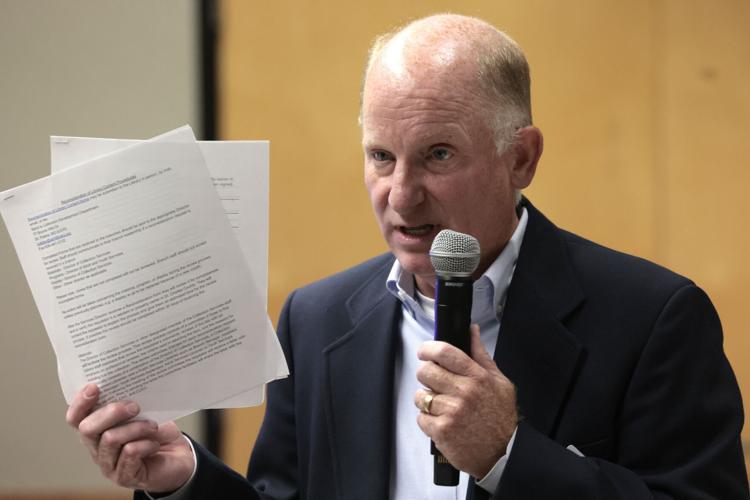ST. CHARLES COUNTY — Facing vocal opposition from residents, the St. Charles County library board has tabled a proposal that critics worried would give unelected board members the authority to remove books from the library.
However, the trustees did approve a similarly controversial policy that outlines how the library system will decide what exhibits should be on display in branches.
The 8-1 decision to delay the vote on book challenges came after nearly two dozen speakers addressed the board. Most disagreed with allowing library patrons to take their requests to ban specific books or library exhibits that they find offensive to the library’s trustees, who are appointed by St. Charles and St. Charles County officials.
Many of the speakers at Tuesday’s meeting said they worried that books with LGBTQ characters and themes would be specifically targeted by conservative patrons, who in recent years have filed a number of challenges or have spoken out about LGBTQ-related books being included in the library’s collection.
People are also reading…
“For my more conservative brothers and sisters, I respect you and I get it, but if there is something that you don’t like, don’t read it. Don’t check it out,” said Pat Pionke, a retired elementary school teacher, who spoke in opposition to the policy.
The tabled proposal clarifies an appeals process that has existed for years and is not sinister as critics fear, said library CEO John Greifzu.
When he was hired in February, Greifzu said he found many library policies were out-of-date or were inconsistent with practices. He also found that the reconsideration procedures listed internally for library employees did not match what the public-facing policy described.
“The appeals process to the board has always been in the background,” he said. “But we didn’t tell people about it. The public didn’t know about it.”
Some at the meeting said they doubted such a policy existed.
“It didn’t exist,” said Aimee Robertson, of O’Fallon. “If it had, it would have been exploited by people challenging the books like crazy. They would have absolutely taken it to the board.”
Since November 2023, the library district has fielded 11 requests from patrons to have books they personally considered inappropriate removed from the library’s collection. Only one book was ultimately removed.
The proposal, Greifzu said, outlines who can challenge a book in the library’s collection and what library staff members serve on the review committee. The committee would still send its recommendation to the library director for a decision.
The director’s decision typically has aligned with the committee’s recommendation, but the proposed policy allows for the decision to be appealed to the trustees for review and a final decision. Any books that were retained in the collection could be challenged again after two years, according to a policy draft on the library’s website.
But some of the trustees are pushing to amend the proposal to include a super majority vote of the nine trustees to overturn or amend the staff’s recommendation and to require any votes on book retention to be done in a public meeting, said board president Matthew Seeds.
Those additional provisions are expected to be voted on at the board’s July meeting.
Others said they worried these polices would reignite simmering culture wars in St. Charles County that focused on a transgender library employee’s work attire, on books perceived to be pornographic because they featured gay characters or gay romances, and on various book displays in the library.
“You should not be able to determine or define or dictate what is available to the rest of the community simply it does not appeal to you as an individual,” said Sara Hemmann, of St. Peters. Hemmann, a mother of three, said one of her children is LGBTQ.
But some who attended the meeting supported the policy and wanted it to go further.
Shelley Gowen said “citizens need to be involved in what our tax dollars are paying for,” and urged the board to create a citizen advisory board to screen books prior to them being added to the library’s collection.
Greifzu said in an interview there are no plans to create a citizen advisory panel to screen books.
“The duties of curating the collection remain with the librarians,” Griefzu said. “This policy doesn’t change that.”
Library displays
After the meeting, library officials sought to clarify the library’s new policy for determining districtwide displays and exhibits.
Some of the speakers at the meeting said they worried displays on Black, women’s or LGBTQ history might be blocked in the future.
Others at the meeting, including Theresa Lintzenich, of St. Charles, said they supported the policy. Lintzenich said she was disappointed to find that the district’s LGBTQ display this month “only has pro-Queer theory books on it” and that it should include books written by “once-gay persons.”
Library spokesperson Lori Beth Crawford said the policy largely focuses on a displays at each library branch of about 10 to 15 books that share a common theme. These themes can include nationally recognized bestsellers, new releases and for specific heritage and appreciation months, such as African American History Month in February, Women’s History Month in March or LGBTQ Pride month in June.
“These are not elaborate displays,” Crawford said. “These are displays of a few books on a table with a simple sign.”
Crawford said the policy, which goes into effect July 1, will use federally recognized heritage months as a guide for determining what displays to have in the library. Per the policy, she said, the trustees will not be presented with a list of displays. Instead, the board will only weigh in on a display if, and when, a challenge and appeal is filed by a patron.
Greifzu also sought to clarify that the policy’s “balanced representation of viewpoints,” does not mean that a hypothetical display on the Holocaust would also include a display of books from Holocaust deniers or that a display on LGBTQ Americans would also include books from individuals critical of the LGBTQ community.
“What we mean by having a variety of viewpoints is that if we were having a display on a person’s life, that we would include a book from that person’s childhood teacher, their friend, or from someone they worked with,” Greifzu said.
“We get that people are concerned,” he said. “But it is not what people think.”
Post-Dispatch photographers capture hundreds of images each week; here's a glimpse at the week of June 8, 2025. Video edited by Jenna Jones.













